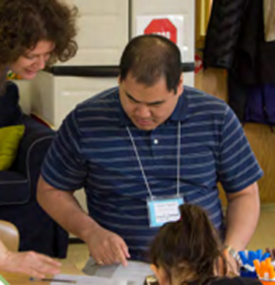17.4: Working with Families
Documenting and assessment should be done collaboratively with families. Families are not just a recipient of information from educators. Parents and other family members bring a broad array of information, feelings, beliefs, and expectations relevant to the child’s experience in the program, including curriculum:
- the child’s temperament, health history, and behavior at home
- family expectations, fears, and hopes about the child’s success or failure
- culturally-rooted beliefs about child-rearing
- parents’ experiences of school and beliefs about their role in relation to professionals
- parents’ sense of control and authority, and other personal and familial influences
Educators have unique information and perspective that they can share with families. Program staff bring their own knowledge, beliefs, and attitudes to their work with families:
- developmental and educational information about the child based on observation and assessment
- information about the child’s performance in the program
- information about the curriculum and learning goals for the child
- knowledge about the child’s next educational environment
- staffs’ own unique personality and temperament, family history, and culture
- their job description, agency policies, and the supervision they receive
- their own training, experience, and professional philosophy
The goal of sharing information with parents about their child is not to make parents do what program staff think needs to be done, nor to see the child as staff do. Instead this process helps program staff to see the child as the parents do. This expands their understanding of the child and the family, so that they can adjust teaching and family support accordingly. When program staff can see the child as parents do, parents know that they can trust them. As a result, they are more likely to be open to program staff perspectives about their child. Information about the child will more effectively flow, from parents to staff, and staff to parents. Then, parents too will have richer information about their child to add to their support of their child’s learning and development at home.
Respectfully sharing these different perspectives is an essential step toward healthy learning environments for children. Regular and purposeful supervision can help program staff recognize when their own perspectives are based upon personal reactions, biases, and cultures, and guide them to effective communication strategies.[1]

Pause to Reflect
What happens when parents and staff have very different perspectives on a child?
- Educators - My Time, Our Place by the Department of Education and Training is licensed under CC BY 4.0 ↵

